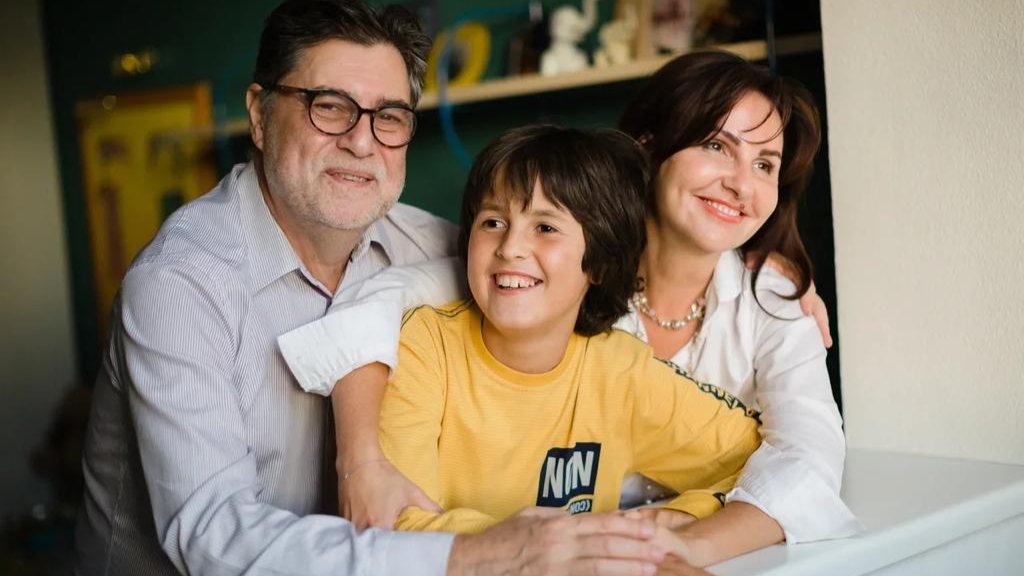Teodor Shanin, a world-renowned sociologist and historian of Russian peasantry, has been dead for over two years. The Moscow School of Social and Economic Sciences, famous in the country as Shaninka, which he founded, still exists and continues to work without him. It turned out that it is not a simple thing to do. Shaninka is going through one of the toughest moments in its history these days. Some staff members, including Rector Sergey Zuev, are held in pre-trial detention centres, other respected professors are being included on Russia's "foreign agent" list, while others are forced to leave Russia fearing criminal prosecution.
Perhaps it is for the best that Teodor Shanin did not live to witness these events. However, as a man who went through deportation, immigration, war, his father’s arrest and the death of his younger sister and grandfather in a ghetto in Vilnius, he might not have been surprised by the history’s ability to repeat itself.
In this article, Novaya Gazeta. Europe explains what is happening today with the famous Shaninka, its rector and other staff members.
Mr Zuev
By the summer of 2022, Professor of Cultural Studies Sergei Zuev, Teodor Shanin’s colleague, pupil and follower, had finished his book about an ideal University. He had been writing it for eight months in Matrosskaya Tishina (Silence of the Sailors — translator’s note) pre-trial detention centre, one of the most famous and oldest prisons in Russia. It was the first experience of such kind for Professor Zuev, and his first time being a prison inmate at age 67.
Back in the mid-90s, when Teodor Shanin was inspired by the idea of creating a British-Russian university in Russia with unique master's programmes, an English-type university library and an outstanding teaching staff, he emphasised the cultural component among other things. Shanin opened a department which had never existed not only in Russia but at that time even in Manchester, UK — the Department of Cultural Management. There was a huge number of cultural institutions in the country, though there was a lack of real specialists in creation and, most importantly, management of cultural institutions. In 1998, Sergei Zuev, by that time a well-known expert in art and culture, was invited to become the Head of the Faculty of Cultural Management at Shaninka. Having graduated from the Department of Romance and Germanic Studies at Moscow State University, where he had transferred from the Chinese section of the Military Institute of Foreign Languages, Zuev started his career as a sociologist and researcher at the All-Russian Research Institute of Art History, and later, in the 1990s, as director of the School of Cultural Policy and the Centre for Cultural Technologies. He organized and ran countless seminars on cultural policy; in the first half of the 2000s he led all kinds of expert and project groups in the development of regional development strategies for a number of Russian regions and republics. Mr Zuev even worked out a strategy of socioeconomic development for the city of Moscow until 2025. Then there would be Shaninka and the Institute of Social Sciences of the Russian Presidential Academy of National Economy and Public Administration (RANEPA), where Sergey Zuev taught his students in great detail and with a lot of enthusiasm.
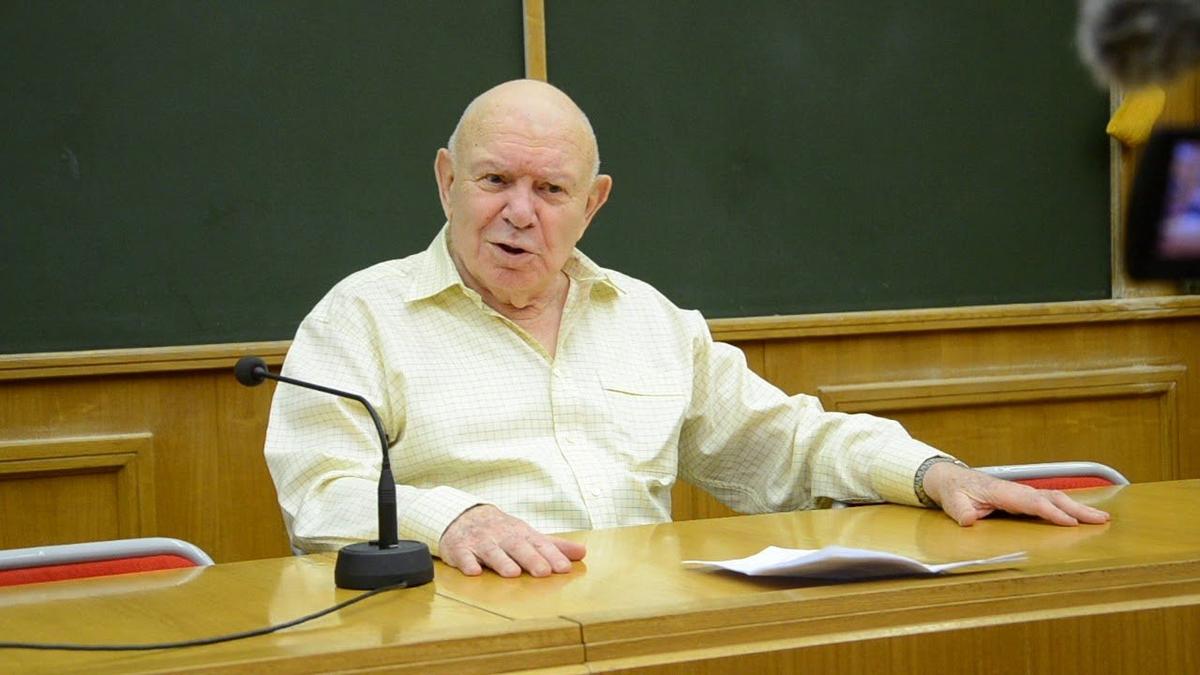
Teodor Shanin, founder of the Moscow School of Social and Economic Sciences Photo by msses.ru
In 2007, Teodor Shanin chose Mr Zuev as his successor as rector, stepping down as president of the School. "We spent a lot of time searching for someone, then I finally realised that the best of my deans, who leads the Cultural Management department, was the perfect person for the Rector’s role. Sergey Zuev is doing very well, in my opinion," Teodor Shanin told his biographer Aleksandr Arkhangelskiy.
In 2016, the Russian authorities awarded Sergey Zuev with the Medal of the Order "For Merit to the Fatherland", Second Class. In 2020, he received the Order of Honour.
And then, in 2021, the legendary Shanin’s follower and administrative heir was arrested. The Moscow courts turned a blind eye to all his honours. They gave no regard to the serious illnesses that Zuev and his youngest son were diagnosed with either.
Shaninka under arrest. The gist of the criminal case
In all 27 years of its existence, Shaninka had never experienced such problems. In 2018, when the School’s founder was still alive, Rosobrnadzor (Federal Service for Supervision in Education and Science, a Russian state bureaucratic agency that oversees education and science) withdrew Shaninka’s state accreditation for educational activities. The officials told Teodor Shanin that his School’s level was supposedly not high enough for teaching students — while the international community was of a different opinion. The revocation of Shaninka's accreditation occurred at the same time as Russia cracked down on another independent educational institution, the European University in St. Petersburg, which had also been deprived of its educational rights. However, at that time, the whole teaching staff of Shaninka, headed by Shanin and Zuev, managed to repel the attempt by the Russian law enforcement to eliminate an educational institution that did not fit into the general bureaucratic system. Shaninka managed to receive accreditation once again (and so was the European University, by the way).
Let bygones be bygones, right?
No such luck. In the autumn of 2021, Shaninka’s Rector Sergey Zuev became the main suspect in a major fraud and embezzlement case.
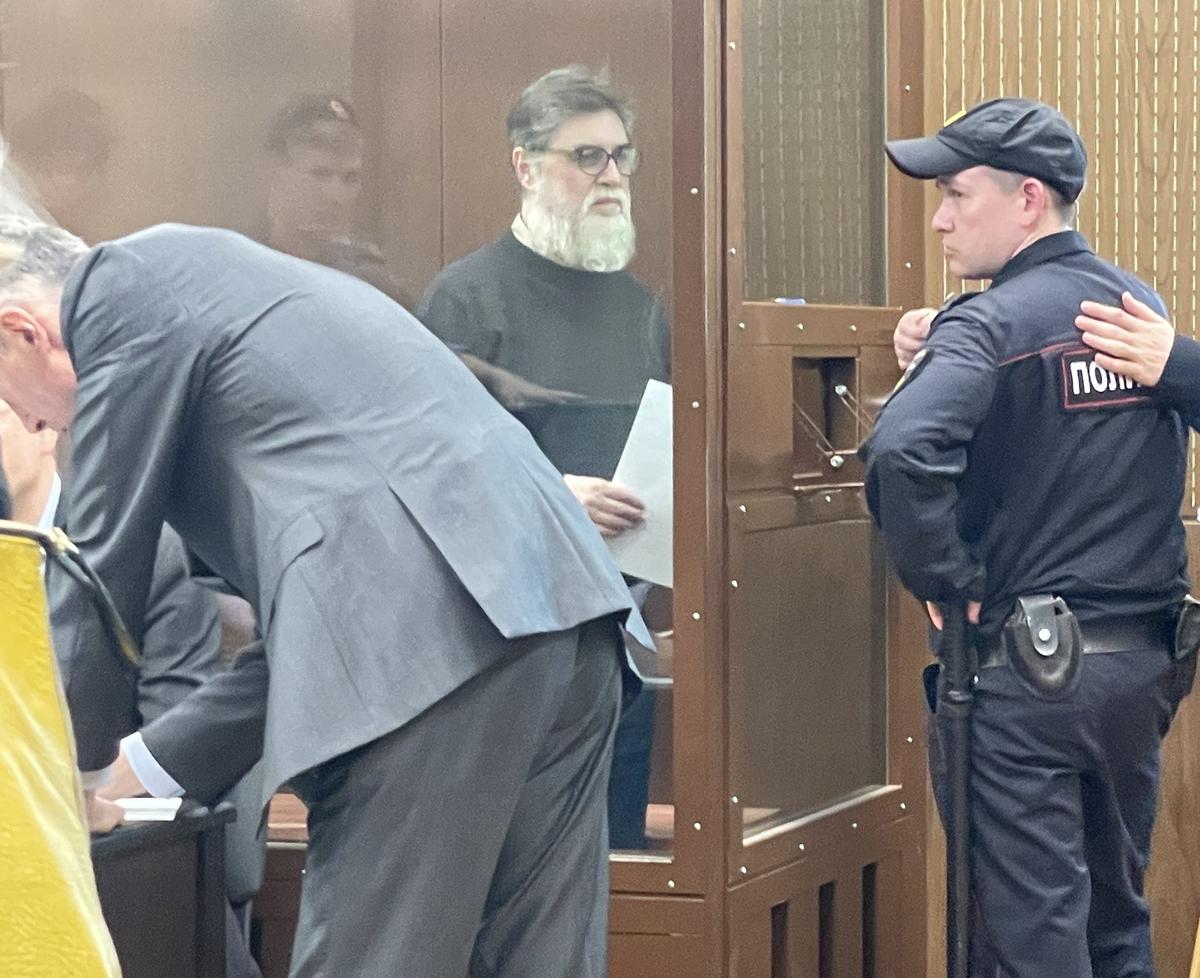
Sergey Zuev in the courtroom. Photo: Vera Chelischeva, exclusively for Novaya Gazeta. Europe
According to the prosecution, Zuev colluded with the former deputy minister of education Marina Rakova to steal money
According to the investigation, in 2019, as deputy head of the Ministry of Education, Ms Rakova succeeded in allocating funds to the Foundation for New Forms of Educational Development, which she herself headed. The ministry allocated the money to the federal project "Teacher of the Future", of which Shaninka was the contractor. The investigation accused the School of substandard work. The investigation based its conclusion on the expertise conducted by the Russian Academy of Education (RAO). We would like to point out that the RAO is now headed by Ms Olga Vasilyeva, the former Minister of Education and Rakova's former boss.
A couple of months ago, Meduza news outlet discovered that there had been an acute and prolonged conflict between the two women while they worked together at the Ministry of Education. Ms Rakova was independent and had her own views which often contradicted Vasilieva’s ones. It led to open collisions. "Ministry officials said that Vasilyeva could shout at her phrases like 'I will destroy you' right in the hall," the source said. According to numerous media reports, the criminal case against Rakova and Shaninka itself may have been linked specifically to the figure of Ms Vasilyeva.
Marina Rakova, her husband, two of her former colleagues and the former Shaninka’s executive officer Kristina Kryuchkova were taken into custody immediately, and 67-year-old Sergey Zuev was put under house arrest by the Tverskoy court of Moscow. The next day, he was hospitalised with a hypertensive crisis and shortly after that, he had the third surgery that year, a coronary artery bypass surgery. The previous two surgeries removed a life-threatening blood clot and recovered normal blood flow to his right leg with the aid of bypass surgery. The doctors insisted on operating on the left leg as well, considering high the risk of gangrene. Zuev didn’t have time to do it — he was remanded to the pre-trial detention centre. He still cannot walk without a cane.
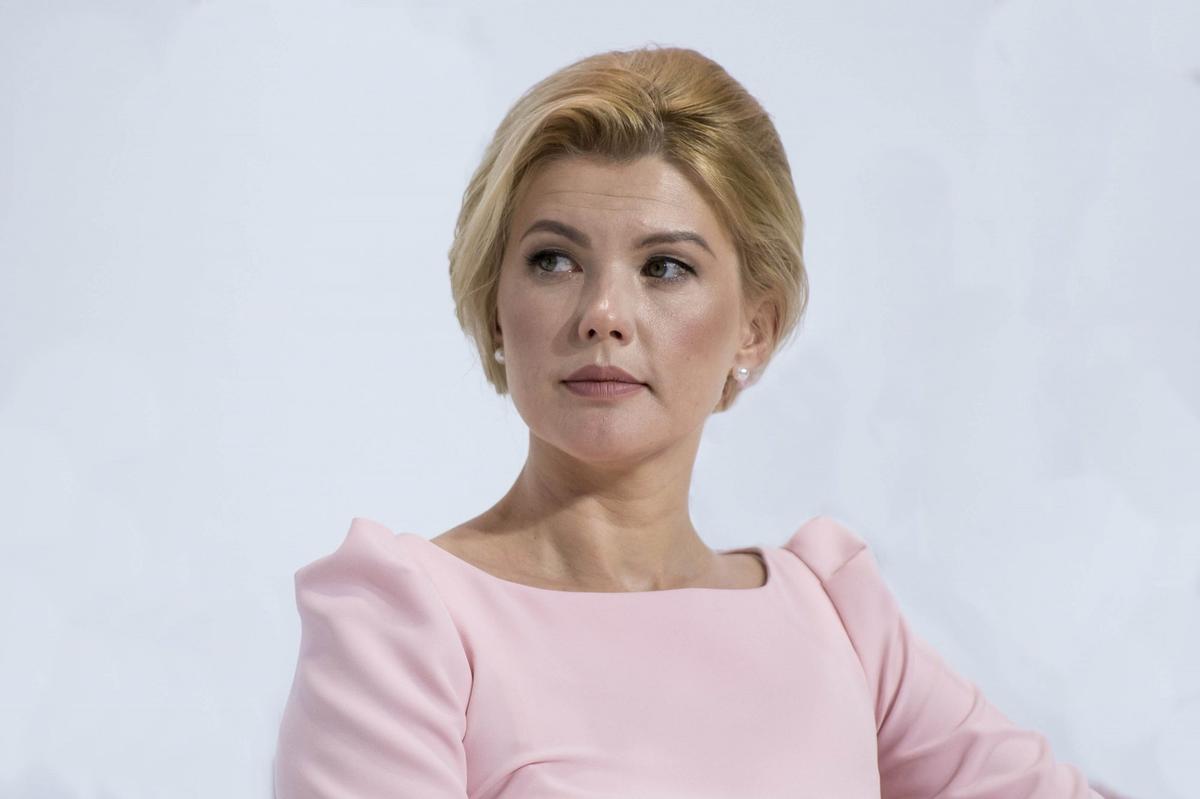
Former Deputy Minister of Education Marina Rakova. Photo: edu.gov.ru
Despite Zuev’s health condition, the prosecutor's office appealed against his house arrest and demanded to send the scientist to a pre-trial detention centre. The Moscow City Court granted this motion. When they arrested Zuev right after the court hearing, the guards did not even allow him to take his personal belongings, including his blood pressure monitor (the professor's blood pressure reached up to 200 after the heart surgery).
The only suspect who was placed under house arrest a month later was Kristina Kryuchkova. She pleaded guilty.
Nobels for Zuev
Of course, Sergey Zuev's arrest did not go unnoticed. There was a great deal of support. His nine-months-pregnant eldest daughter picketed alone in front the Moscow City Department of the Ministry of Internal Affairs. The entire Russian and international research community also stood up for him. About 650 scientists wrote appeals to President Putin and Russian Commissioner for Human Rights Tatyana Moskalkova. They requested to place Zuev, who has heart problems, under house arrest. Among these scientists were Nobel Prize winners David Gross, Konstantin Novoselov and Phillip Sharp.
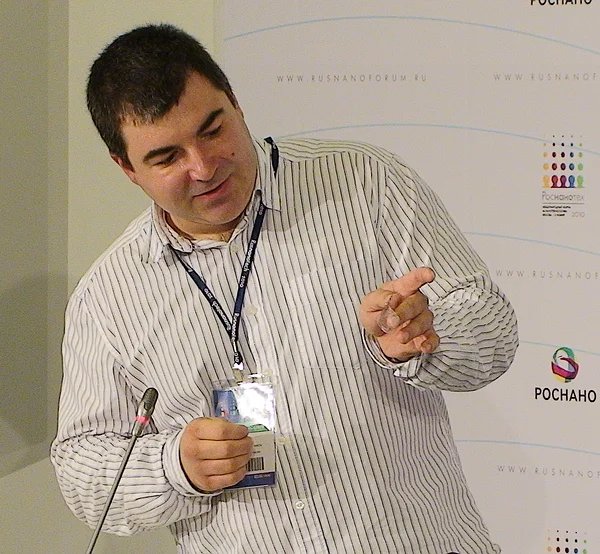
Konstantin Novoselov, winner of the Nobel prize in Physics. Photo: eduspb.com
The other reason why they requested house arrest for Zuev is his younger son’s illness — the 13-year-old boy suffers from a severe form of autism. The child doesn’t speak. He is very fond of his father.
This issue was brought up in the appeals to state bodies, including those addressed to the Russian President personally, not only by representatives of the Russian and international scientific community, but also by students, graduates and professors of Shaninka, as well as by workers of the cultural sector, charities and socially-oriented NGOs, and most importantly, by the community of parents raising children with special needs. They wrote: "To send into custody a parent of an autistic child when this parent has not been yet found guilty and is of no threat to the society in our view is an extremely inhumane act as it impacts negatively the situation of the child."
Hundreds of people signed Zuev's bail bond, including the widow of the writer Aleksandr Solzhenitsyn, Natalia Solzhenitsyna, literature expert Aleksandr Arkhangelsky, and Editor-in-Chief of Novaya Gazeta and Nobel Prize laureate Dmitry Muratov. In Russia, bail bonds can be signed by people vouching for the defendant. In some cases, courts can reconsider the chosen measure of restraint after a bail bond is signed, however, in politically motivated cases such as this one, it is unlikely.
It must be noted that the Commissioner for Human Rights Tatyana Moskalkova who received some of the appeals did everything she could. She personally appealed to the prosecutor’s office and the investigative authorities asking to release Zuev from custody.
However, nothing changed.
In December 2021, during a court session on prolonging his measure of restraint, Zuev felt unwell right in the courtroom due to high blood pressure. An ambulance came to the court and managed to bring the pressure down. Despite the defendant's complaints, Judge Aleksey Krivoruchko extended his arrest for three months at once — despite doctors' certificates that the scientist was at risk of health complications, a stroke and even amputation of the leg.
The same judge had previously extended the custody of auditor Sergey Magnitsky, ignoring his complaints about the poor state of his health. Magnitsky was later found dead in his cell
By the end of 2021, a little hope had appeared. During his traditional meeting with the members of the Human Rights Council, President Vladimir Putin said that he saw no need in keeping Zuev behind bars.
Professor Zuev was not released neither the day after, nor six months after this statement.
Shaninka’s Rector celebrated the New Year 2022 in jail.
"I’ve got a library with more than sixty books, a long to-read list from my colleagues and I’m waiting for new arrivals," Zuev told Novaya Gazeta in an interview about his prison life. “When I take a break, I read the Strugatsky brothers (how can I not?). And yes, thanks to my friends and pupils for continuing to send me books. My cellmates are utterly bewildered — though in a very positive way, for which I am very grateful."
A desperate move
Professor Zuev is not allowed to see or to call his relatives, which was decided by an investigator called Kabanov and by the court. With no explanation. Like thousands of prisoners of Russia, he is not granted this right. There is a letter in the archive of Tverskoy Court of Moscow:
"We, labour veterans, people who have been retired for a long time — Vera Kuzminichna Efremova (born in 1927) and Eduard Nikolaevich Zuev (born in 1937) — have decided to address you in connection with the fact that our son, Sergey Eduardovich Zuev, is being held at the pre-trial detention centre No. 1 'Matrosskaya Tishina'. <…> Since, as Russian songwriter Bulat Okudzhava said, 'our ship is approaching the quay', we fear we may not be able to see him again before we pass. This is why we only ask you to give us the permission to see our son, or at least to make a phone call.”
They were not allowed neither to see nor to call their son.
In March, Sergey Zuev took an extremely rare step for those who do not admit their guilt. He partially paid the damage to the state — six million rubles (about €100,000), with which the investigation charged him for fraud. According to the law, it is possible to pay damages without admitting guilt, pending a court verdict.
By the summer 2022, Zuev has paid ten million rubles (about €165,000) in damages.
The investigation and the courts still refused to release the sick professor from pre-trial detention. He still denies being guilty of any fraud.
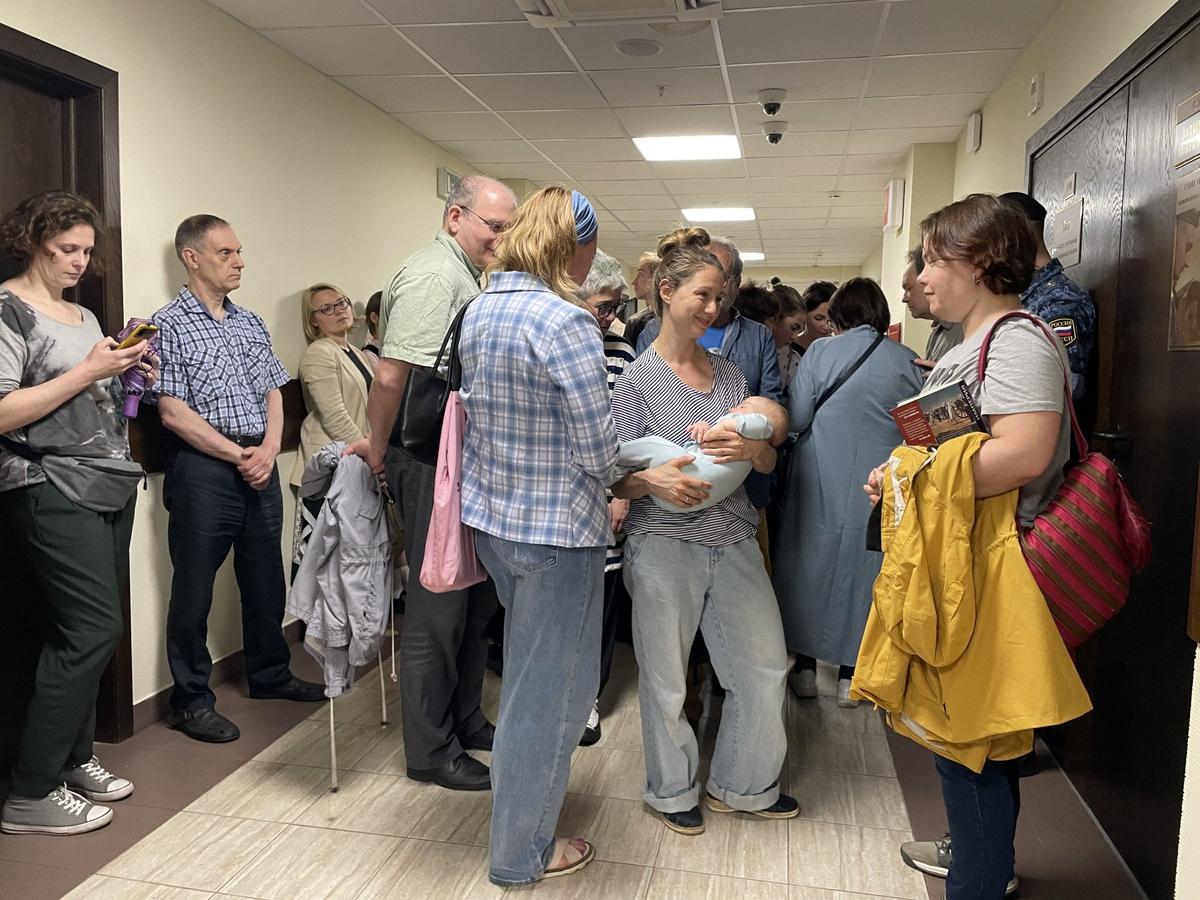
People that came to support Sergey Zuev in court. Pictured in the centre of the picture is his daughter Darya with her son Pavel. Photo: Vera Chelischeva, exclusively for Novaya Gazeta. Europe
About the war
Over the last eight months of Zuev's custody in the pre-trial detention centre, various events happened around Shaninka itself. For instance, in early April, the second month of Russia's war in Ukraine, the Ministry of Internal Affairs requested from Shaninka a number of documents regarding the collaboration with teachers who expressed criticism of the current Russian authorities. The request included ten professors, including political scientist Ekaterina Shulmann, sociologist Grigory Yudin, journalist Konstantin Gaase, and Shaninka political science faculty member Ilya Budraitskis. The majority of them had no choice but to leave Russia after the events that had begun on 24 February.
The Ministry of Internal Affairs requested the university to provide the employment contract, payroll transactions, time sheets and some other documents.
This request gained a lot of public attention. So far, there have been no new developments following the initial reports.
In late April, the Ministry of Justice recognised a Shaninka staff member as a "foreign agent" for the first time. It was the Dean of the Faculty of Social Sciences Viktor Vakhshtein.
The ideal University
Zuev dedicated the book that he had been writing during his last months in pre-trial detention to University in its "universal" meaning. He admitted that he often wrote lying down (because of his health condition), though he was able to think and write. He was also advised by his colleagues by mail.
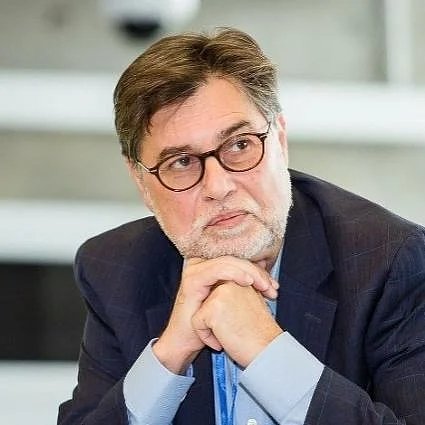
Photo by msses.ru
"Its working title is University. The guardian of the ideal," Zuev said in his interview to Novaya Gazeta. "This title goes perfectly with the current state and atmosphere. Its main point is that the University is one of the few (if not the only) institutions created by our human civilization which doesn’t build its activity on the orders from the outside, but on its own ideas of what is ideal or appropriate. It is a sort of utopia about the future. I think I’ve always tried to implement this idea in my work."
It seems, however, that there will be no ideal universities in Russia in the near future, just as Teodor Shanin saw and created them and as Sergei Zuev sees them today.
Quite recently, the Russian Ministry of Education and Science, following the announcement made by the Chairman of the Russian Security Council, Nikolay Patrushev, who said that Russia will abandon the Bologna Process and develop its own domestic, or "unique", model of higher education. It turned out that the Bologna system had "destroyed the foundations" of higher education in Russia.
What a peculiar response to the sanctions imposed on Russia that followed its "special military operation" in Ukraine.
The youngest son
On 3 June, 2022, Sergey Zuev’s arrest was extended once again. His youngest daughter Darya came to the courtroom with her eighton-month old baby. So the scientist could see his grandson for the first time, through the doorway, sitting in a glass cell. Only for a couple of seconds… but he saw him.
The Shaninka's Rector middle son, 14-year-old Nikita, who had come to see his father, was rudely escorted out of the hall by a guard. One is allowed to enter the courtroom only from the age of sixteen.
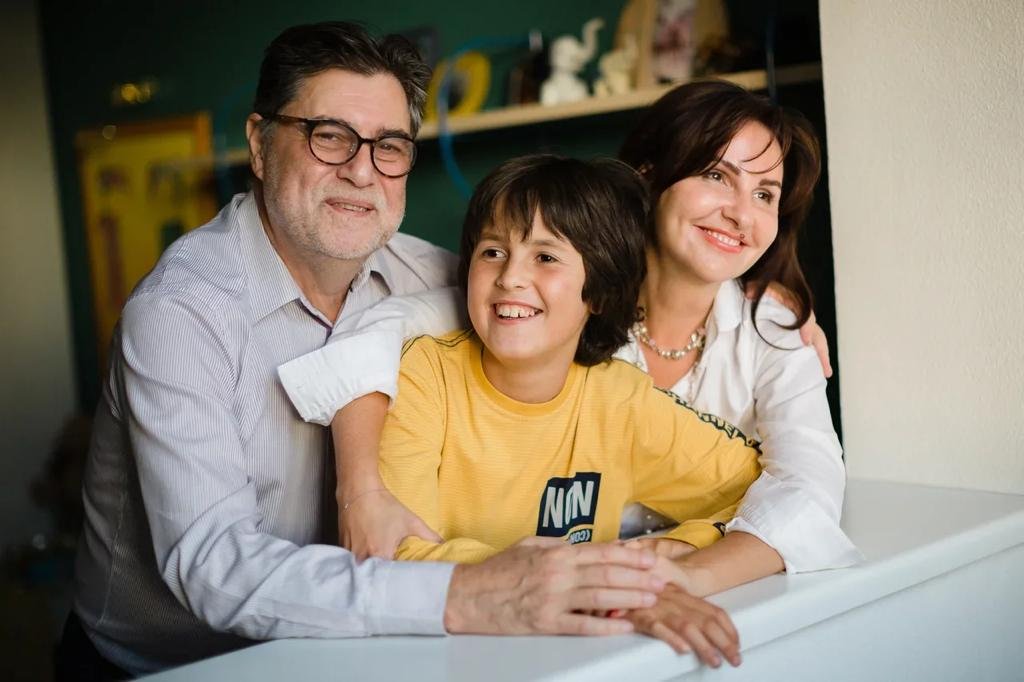
Sergey Zuev with his youngest son Gleb and his wife Elizaveta. Photo from the family archive
The rest was rather ordinary. In the chair adorned with two eagles sat Judge Olga Zatomskaya, best known as Borovkova (her maiden name), who previously sent a number of Russian opposition figures, including the late Boris Nemtsov, to a pre-trial detention facility, and did it promptly and with no evidence. Today, she extends the arrests for criminal cases with no evidence. The young woman read aloud with great rush all of Zuev's medical diagnoses. The young investigator Kabanov didn’t want to dedicate five minutes to explain why the house arrest was impossible for the scientist. "I object to the arguments of the defence," Mr Kabanov said and started scrolling on his phone. The same was said by the elderly prosecutor, who has been working for decades during the arrests in Tverskoy Court. She was more concerned about the heat in the courtroom and her mobile phone, which she hid under the table.
Zuev's cane, without which he can no longer move, stood near the door of his glass cell, as if waiting for its owner. The scientist himself, when given the opportunity to speak, said to Judge Zatomskaya:
— I have been in custody for long enough. I do not really understand how I could obstruct the investigation (the latest investigative action with Zuev took place on 25 November 2021 — editor's note) or how I could evade justice. There are no facts to confirm my intentions of this kind. When I was under house arrest, I had not received any remarks about it, as I have a certificate from the Federal Penitentiary Service. As a matter of fact, I still do not understand why I have been transferred from house arrest into custody. It may not be that important.
What is most important for me today is the fact that these days my family depends on me enormously.
My mother has just turned 95. The situation is very delicate. I fear that my detention could have a particularly negative impact on her.
I can tell the same about my disabled son whose health has been worsening more and more after I had disappeared from home. He must take tranquilizers. The doctors know that there is no return from this kind of therapy. When someone starts to take tranquilizers and keeps taking them for long enough, there will be no possibility to suspend them in future.
Finally, my condition keeps worsening. According to the information that I received during my visit to Sklifosofsky Medical Institute, I need surgery. It requires preparation. I should be operated by the same surgeon who operated on me before. He knows me and my problems. All of this is possible only if I am at least under house arrest, but not in custody.
Furthermore, I confirm as usual my entirely objective intention to cooperate with the investigation. I have never interfered with proper procedural interviews. Perhaps for this reason, it would be possible to place me under house arrest.
Judge Zatomskaya-Borovkova spent half an hour in the deliberation room and refused to place Shaninka’s Rector under house arrest.
Translated by Asiya Aitmatova
